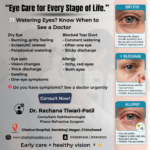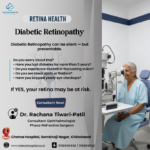In today’s digital age, children are exposed to screens more than ever before. Whether it’s online learning, playing games, or watching cartoons, screen time has become an integral part of their daily lives. While digital devices offer numerous benefits, excessive use can lead to a range of health issues—especially concerning their vision.
In this blog, we explore how too much screen time affects children’s eye health, the symptoms to watch for, and practical steps parents can take to protect their child’s vision.
Understanding the Impact of Screens on Young Eyes
Children’s eyes are still developing, making them more susceptible to the harmful effects of prolonged screen exposure. Unlike adults, children blink less frequently while using digital devices, which can lead to dryness and discomfort. Their eyes also have less ability to filter harmful blue light, making them more vulnerable to digital eye strain and long-term vision problems.
Common Vision Problems Linked to Screen Time
1. Digital Eye Strain (Computer Vision Syndrome)
This condition occurs when the eyes are overworked due to extended screen exposure. Symptoms include:
- Eye fatigue
- Blurred vision
- Burning or itching sensation
- Headaches
- Difficulty concentrating
2. Dry Eyes
Reduced blinking while staring at screens leads to decreased tear production, resulting in dry, irritated eyes. Children may complain of discomfort or frequently rub their eyes.
3. Myopia (Nearsightedness)
Studies show a direct correlation between increased screen time and the rising rates of childhood myopia. When children focus on close-up screens for extended periods and spend less time outdoors, their risk of developing nearsightedness increases significantly.
4. Eye Fatigue and Poor Focus
Constantly shifting between near and far focus becomes difficult for young eyes that are repeatedly strained. This can lead to trouble focusing in class or reading printed material.
5. Sleep Disruption
Exposure to blue light in the evening can interfere with the natural sleep cycle by suppressing melatonin production. Poor sleep can indirectly affect eye health and overall development.
Warning Signs Parents Should Watch For
Identifying vision problems early is crucial. Here are some signs that your child might be experiencing screen-related vision issues:
- Frequent eye rubbing
- Squinting while reading or watching TV
- Complaining of headaches
- Holding screens too close to the face
- Avoiding screen time due to discomfort
- Difficulty keeping focus during studies
If you notice any of these symptoms, it’s essential to schedule an eye examination.
How Much Screen Time Is Safe?
The American Academy of Pediatrics offers these screen time recommendations:
- Children under 2 years: No screen time (except video chatting)
- Ages 2–5 years: Up to 1 hour per day of high-quality programming
- Ages 6 years and above: Consistent limits to ensure screen time doesn’t interfere with sleep, physical activity, and social interactions
Practical Tips to Protect Your Child’s Vision
1. Follow the 20-20-20 Rule
Encourage children to take a break every 20 minutes by looking at something 20 feet away for at least 20 seconds.
2. Limit Screen Exposure
Set boundaries for recreational screen time and prioritize activities like outdoor play and reading printed books.
3. Adjust Screen Settings
Use blue light filters or night mode on devices, and reduce screen brightness to comfortable levels.
4. Maintain Proper Distance
Ensure the device is at least 18–24 inches from the eyes and positioned slightly below eye level.
5. Create a Blink Reminder
Teach children to blink more often while using screens to prevent dryness.
6. Encourage Outdoor Activities
Spending time in natural light has been shown to reduce the risk of myopia and improve overall eye health.
7. Schedule Regular Eye Exams
A comprehensive eye check-up can detect early signs of vision problems and prevent further complications.
Role of Eye Specialists
Pediatric ophthalmologists and optometrists play a vital role in managing screen-related vision issues. They can provide tailored advice, prescribe glasses if needed, and recommend exercises or therapies to strengthen the eyes.
Consulting an eye specialist becomes essential if your child shows persistent symptoms or if they have a family history of vision problems.
Contact us on 9168690448 / 9158681123
Website – www.chetnahospital.co.in
Address – Chetna Hospital,
Sambhajinagar, MIDC, G Block, Near Rotary Club, Chinchwad 411019
.
.
.
#hospital#pune#pcmc#chinchwad#medical#medicalservices#dryeyetreatment#dryeyerelief#dryeyedisease#dryeyetherapy#catract#catractsurgery#catracteyesurgery#catracteyeoperation#eyedoctor#eye#glaucoma#conjunctivitis#ophthalmologist#eyediseases#eyepain#pinkeye#hazeleyes#myopia#eyeinfection#amblyopia#dryeyesyndrome#eyeproblems#motibindu#motibinduoperation













